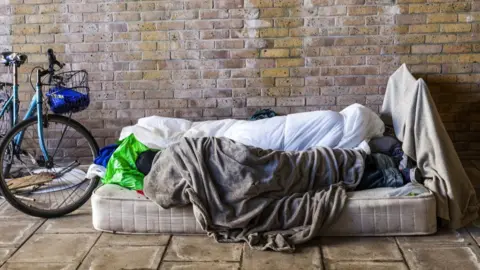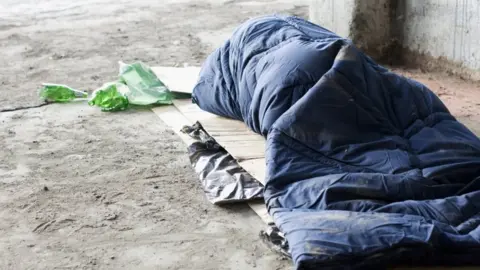Bristol council warns low homeless figures may not last
 Getty Images
Getty ImagesRough sleeping in Bristol has fallen by almost three quarters, but councillors fear the figure could rise once the impact of the pandemic "hits home".
Official figures show the number of homeless people has reduced from 98 in November 2019 to 21 in January.
Councillors welcomed the news but said without more help from the government the number could rise again come April.
Charities involved in the effort said it is still "more important than ever" to provide rapid support.
Bristol City Council says it has helped almost 1,400 people rough sleeping or homeless to move into emergency accommodation.
The fall in the number of rough sleepers follows a nationwide "Everyone In" scheme, which has housed about 37,000 people since the pandemic hit last March.
 Getty Images
Getty ImagesBut Bristol councillor Helen Godwin, cabinet member for women, children and homes, said: "We have received funding from the government throughout the Covid-19 pandemic but these funds have not covered the full costs of Everyone In in Bristol.
"Without government support there will be rough sleepers returning to our streets from 1 April."
Bristol mayor Marvin Rees added: "The pandemic has fast-tracked our ambitions to end rough sleeping in the city. However, we are well aware that we are still in need of a long-term solution.
"We are anticipating higher levels of homelessness when the impacts of the pandemic hit home for many people."
'Unprecedented opportunity'
Homeless charity St Mungo's says it has been working "flat out" to support rough sleepers in Bristol since the pandemic started.
Gareth Mercer, the charity's Bristol manager for rough sleeping services, said: "These figures are a real testament to the sheer hard work and tenacity of our team.
"Undeniably, the pandemic has given us an unprecedented opportunity to build relationships with people on the streets who previously have, for their own reasons, preferred not to engage with our teams.
"However, we know that homelessness is not a static issue and with the economic downturn and increased unemployment it is more important than ever that we are able to provide rapid support."
